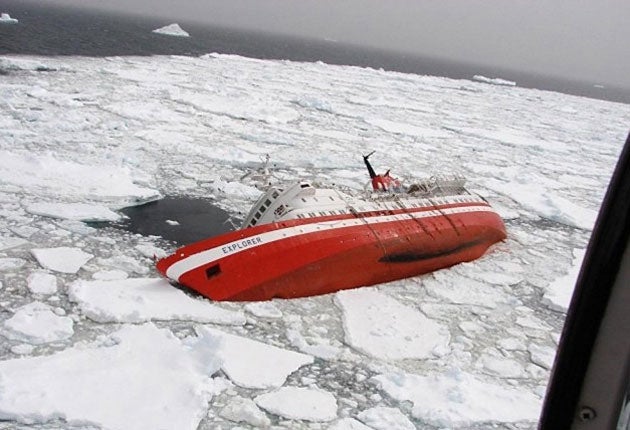The sinking of the Explorer
Tighter controls on tourist vessels are being called for after an inexperienced captain put the lives of 154 passengers and crew at risk. Paul Bignell reports

An "inexperienced and overconfident" captain drove his ship too fast towards a "wall of ice", causing it to sink in freezing Antarctic waters, endangering the lives of 154 passengers and crew – including 24 Britons – a damning accident investigation concludes. Experts say that only the good fortune of unusually benign weather conditions meant no one died when the MV Explorer sank.
The report, which is now being sent to those involved in the sinking, will add to international pressure for tighter regulations on the increasing numbers of cruise ships sailing to the Antarctic. Shipping and polar experts warn that a disaster is waiting to happen unless urgent action is taken.
The investigation, details of which are revealed for the first time by The Independent on Sunday, highlights a litany of errors that might have led to the biggest shipping disaster in Antarctica. It describes how the ship was fatally holed by ice and began to flood rapidly as it attempted to sail through an ice field at night. As water poured into the ship, passengers described how they had to wade shoeless through freezing water in the pitch black to get to safety while crewmen fought to stem the rushing water with pillows and wood. The crew's fight to save the ship was undermined after it lost all power: water flooded emergency generators when a watertight seal failed. The ship's main engine room was swamped after other watertight doors were not closed.
The report describes how chaos reigned on board when orders to take to the lifeboats were given. Georgie Hale, a passenger from Coventry, said that pandemonium ensued: "It was absolute chaos at that point. People just went where they wanted to. The lifeboats were deplorable – there was no organisation at all. The thermal blankets were like nylon body bags and the zip was corroded on all of them." Investigators said some lifeboats were so crowded people had to stand. One of the most damning revelations was that three of the four engines on the lifeboats did not work.
"Once we were in the water, the lifeboats drifted up against the side of the ship," said Eli Charne, an American passenger. "The lifeboats were packed nearly to capacity and because they were open, it felt like you were in a big rowboat.
"The crew tried to push away with the oars, and when that failed they attached a metal object to the end of the oars. I later found out that the metal object was a piece of equipment that was meant to identify us on the radar."
The report blames the lack of Antarctic experience of the Swedish captain, Bengt Wiman. The ill-fated trip was his maiden voyage as a skipper in the region. As a result, the report says, he failed properly to identify the dangers confronting his ship. "In all likelihood, he either would have taken action to avoid the hard ice, or manoeuvred the Explorer with greater attention to the vessel's speed," the report concludes. It criticises him for entering the ice field in darkness and for failing to slow the ship as it approached and then hit the "wall of ice".
It praises the crew and expedition staff for evacuating the ship without loss of life, but expresses reservations about how the evacuation took place. Some crew's failure to don survival suits and start lifeboat engines might have endangered the lives of passengers if the sea conditions had been more severe, it warns.
The captain is criticised for evacuating the ship without taking the vital VDR "white box" accident recorder, which could have given investigators clues to why vital watertight compartments were left open while others leaked. British coastguards, who were liaising with the ship, said they repeatedly advised the captain to remove the VDR. Captain Wiman said the VDR was forgotten as the crew concentrated on evacuating passengers.
Disturbingly, the report reveals that three attempts by the Explorer to contact the Argentine Maritime Rescue Coordination Centre for assistance, resulted in the captain being told to "call back". Only after Chilean maritime rescue control was alerted was assistance provided for the stricken vessel. Two ships closest to the Explorer, HMS Endeavour and a Norwegian cruise ship, the Nordnorge, immediately changed direction to help the stricken ship four hours later.
The Explorer, a 40-year-old, Liberian-registered vessel, sank in deep water in November 2007. It had been on an 18-day round trip voyage from Ushuaia, Argentina, to tour areas in the Antarctic. Passengers paid up to £3,900 for the trip. It had already made more than 200 trips to the region under other captains.
The report recommends "administrative action" be taken against Captain Wiman "in view of his lack of knowledge which contributed to the cause of the casualty".
The ship's owner, GAP Shipping, is criticised for failing to secure the accident recorder and for its treatment of passengers. Neither the ship owner nor Captain Wiman was available for comment yesterday.
Subscribe to Independent Premium to bookmark this article
Want to bookmark your favourite articles and stories to read or reference later? Start your Independent Premium subscription today.

Join our commenting forum
Join thought-provoking conversations, follow other Independent readers and see their replies